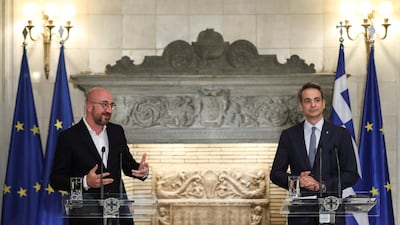Greek Prime Minister Kyriakos Mitsotakis met European Council President Charles Michel on Tuesday and afterwards warned Turkey against more unilateral action in the Eastern Mediterranean.
Mr Mitsotakis said he was open to dialogue with Turkey over territorial disputes.
However, he said there could be no discussions over the contested maritime borders if Turkey did not move towards de-escalation in the Eastern Mediterranean.
"Turkey has time to continue the first step of disengagement from the crisis and its actions must have continuity and consistency in order to create a suitable ground for the dialogue to bear fruit," he said, according to Greek TV news.
“Until there is a final demarcation, the international law of the sea prohibits unilateral actions," he added.
Mr Michel said the EU needed to be strict and firm in the Eastern Mediterranean but it should also remain open to bilateral talks if they were possible.
“The question of the predictability of our external relations is not an affair for Greece or Cyprus but an affair for the European Union,” he said.
Earlier, the EU’s foreign policy chief, Josep Borrell, said that de-escalation was necessary for dialogue and negotiations to advance.
Greece and Turkey have been engaged in a naval stand-off in recent weeks brought about by the arrival of a Turkish research vessel in Greek waters.
The subsequent withdrawal of the ship, the Oruc Reis, which was accompanied by a convoy of Turkish warships, has cooled tempers over old disagreements in the region. Disputes over airspace and maritime borders have intersected with the conflict in Cyprus and have gone unresolved for decades.
Despite the departure of the Oruc Reis, Ankara hit out at Washington on Monday after a telephone conversation between US Secretary of State Mike Pompeo and Turkish Foreign Minister Mevlut Cavusoglu.
Turkey was angered by Mr Pompeo's visit to the Cypriot capital Nicosia and the lifting of a US arms embargo on the country.
Only Ankara recognises the self-declared government in the north of the country.
Fadi Hakura, a consulting fellow on think tank Chatham House's Europe programme, told The National that Turkey's aggressive posturing over Cyprus and the Eastern Mediterranean more generally were meant as a distraction from its domestic problems.
“This very emotional language is mostly geared to the domestic political consumption in light of the deteriorating economy,” Mr Hakura said.
“If you look at opinion polls, Turks find increasingly fighting the coronavirus pandemic, [the] economy, unemployment and health issues as key priorities by overwhelming margins."
Some technical talks between Turkey and Greece have been hosted by Nato in Brussels in recent weeks. A Nato official said that the discussions were aimed at establishing “mechanisms for military deconfliction to reduce the risk of incidents and accidents in the Eastern Mediterranean”.
However, Mr Hakura said that recent skirmishes in the Eastern Mediterranean had done little to change the substantive, decades-old disagreements between Greece and Cyprus on one side and Turkey on the other.
“[Turkey] might wait a number of months. But I would not be surprised if Turkey was to dispatch another research ship into the disputed part of the zone, the Eastern Mediterranean, as well as between Turkey and Cyprus,” he said.












